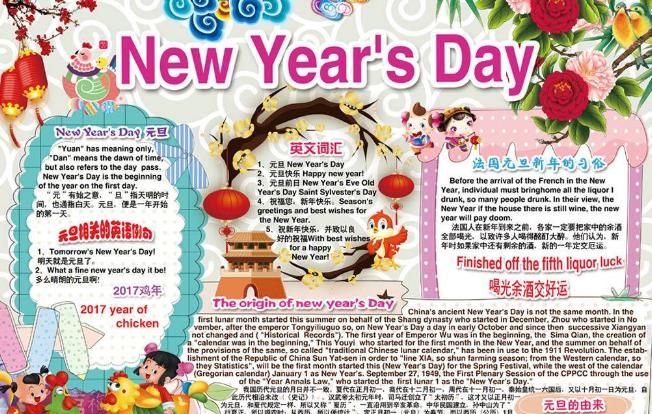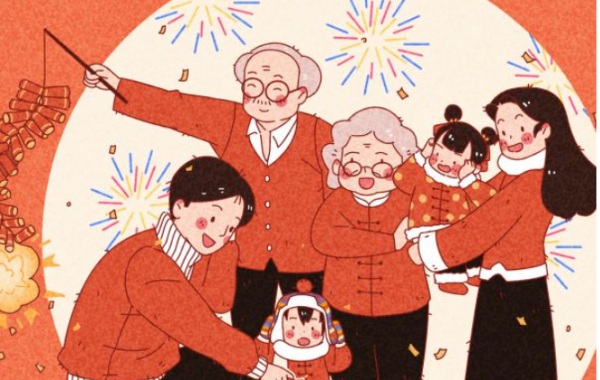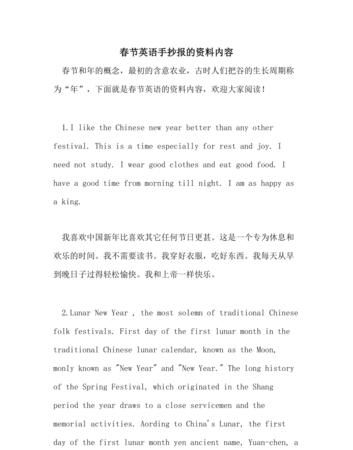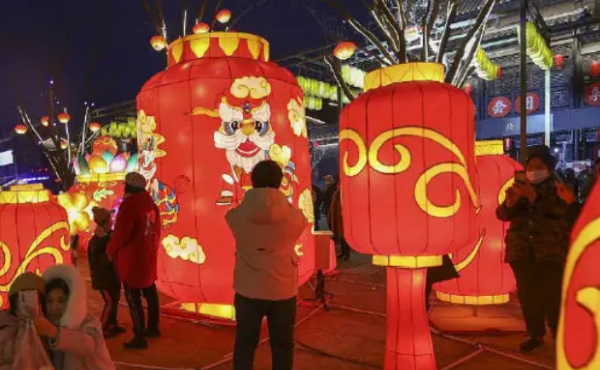本文目录
关于春节的简介英文版
春节,是农历正月初一,又叫阴历年,俗称“过年”。这是我国民间最隆重、最热闹的一个传统节日。那么关于春节的简介英文是怎么写的呢?下面由我为你提供的关于春节的简介英文,希望能帮到你。
关于春节的简介英文(一)
Spring Festival is the most important festival in China .It’s to celebrate the lunar calendar ‘s new year .In the evening before the Spring Festival ,families get together and have a big meal .In many places people like to set off firecrackers .Dumplings are the most traditional food .Children like the festival very much ,because they can have delicious food and wear new clothes .They can also get some money from their parents. This money is given to children for good luck . People put New Year scrolls on the wall for good fortune .
The Spring Festival lasts about 15 days long .People visit relatives and friends with the words “Have all your wishes ”. People enjoy the Spring Festival ,during this time they can have a good rest .
关于春节的简介英文(二)
Spring Festival
The Spring Festival is the most important festival for the Chinese people and is when all family members get together, just like Christmas in the West. All people living away from home go back, becoming the busiest time for transportation systems of about half a month from the Spring Festival. Airports, railway stations and long-distance bus stations are crowded with home returnees.
The Spring Festival falls on the 1st day of the 1st lunar month, often one month later than the Gregorian calendar. It originated in the Shang Dynasty (c. 1600 BC-c. 1100 BC) from the people's sacrifice to gods and ancestors at the end of an old year and the beginning of a new one.
Strictly speaking, the Spring Festival starts every year in the early days of the 12th lunar month and will last till the mid 1st lunar month of the next year. Of them, the most important days are Spring Festival Eve and the first three days. The Chinese government now stipulates people have seven days off for the Chinese Lunar New Year.
Many customs accompany the Spring Festival. Some are still followed today, but others have weakened.
On the 8th day of the 12th lunar month, many families make laba porridge, a delicious kind of porridge made with glutinous rice, millet, seeds of Job's tears, jujube berries, lotus seeds, beans, longan and gingko.
The 23rd day of the 12th lunar month is called Preliminary Eve. At this time, people offer sacrifice to the kitchen god. Now however, most families make delicious food to enjoy themselves.
After the Preliminary Eve, people begin preparing for the coming New Year. This is called "Seeing the New Year in".
Store owners are busy then as everybody goes out to purchase necessities for the New Year. Materials not only include edible oil, rice, flour, chicken, duck, fish and meat, but also fruit, candies and kinds of nuts. What's more, various decorations, new clothes and shoes for the children as well as gifts for the elderly, friends and relatives, are all on the list of purchasing.
Before the New Year comes, the people completely clean the indoors and outdoors of their homes as well as their clothes, bedclothes and all their utensils.
Then people begin decorating their clean rooms featuring an atmosphere of rejoicing and festivity. All the door panels will be pasted with Spring Festival couplets, highlighting Chinese calligraphy with black characters on red paper. The content varies from house owners' wishes for a bright future to good luck for the New Year. Also, pictures of the god of doors and wealth will be posted on front doors to ward off evil spirits and welcome peace and abundance.
The Chinese character "fu" (meaning blessing or happiness) is a must. The character put on paper can be pasted normally or upside down, for in Chinese the "reversed fu" is homophonic with "fu comes", both being pronounced as "fudaole." What's more, two big red lanterns can be raised on both sides of the front door. Red paper-cuttings can be seen on window glass and brightly colored New Year paintings with auspicious meanings may be put on the wall.
People attach great importance to Spring Festival Eve. At that time, all family members eat dinner together. The meal is more luxurious than usual. Dishes such as chicken, fish and bean curd cannot be excluded, for in Chinese, their pronunciations, respectively "ji", "yu" and "doufu," mean auspiciousness, abundance and richness. After the dinner, the whole family will sit together, chatting and watching TV. In recent years, the Spring Festival party broadcast on China Central Television Station (CCTV) is essential entertainment for the Chinese both at home and abroad. According to custom, each family will stay up to see the New Year in.
Waking up on New Year, everybody dresses up. First they extend greetings to their parents. Then each child will get money as a New Year gift, wrapped up in red paper. People in northern China will eat jiaozi, or dumplings, for breakfast, as they think "jiaozi" in sound means "bidding farewell to the old and ushering in the new". Also, the shape of the dumpling is like gold ingot from ancient China. So people eat them and wish for money and treasure.
Southern Chinese eat niangao (New Year cake made of glutinous rice flour) on this occasion, because as a homophone, niangao means "higher and higher, one year after another." The first five days after the Spring Festival are a good time for relatives, friends, and classmates as well as colleagues to exchange greetings, gifts and chat leisurely.
Burning fireworks was once the most typical custom on the Spring Festival. People thought the spluttering sound could help drive away evil spirits. However, such an activity was completely or partially forbidden in big cities once the government took security, noise and pollution factors into consideration. As a replacement, some buy tapes with firecracker sounds to listen to, some break little balloons to get the sound too, while others buy firecracker handicrafts to hang in the living room.
The lively atmosphere not only fills every household, but permeates to streets and lanes. A series of activities such as lion dancing, dragon lantern dancing, lantern festivals and temple fairs will be held for days. The Spring Festival then comes to an end when the Lantern Festival is finished.
China has 56 ethnic groups. Minorities celebrate their Spring Festival almost the same day as the Han people, and they have different customs.
关于春节的英文资料
1.I like the Chinese new year better than any other festival. This is a time especially for rest and joy. I need not study. I wear good clothes and eat good food. I have a good time from morning till night. I am as happy as a king.
我喜欢中国新年比喜欢其它任何节日更甚。这是一个专为休息和欢乐的时间。我不需要读书。我穿好衣服,吃好东西。我每天从早到晚日子过得轻松愉快。我和上帝一样快乐。
2.春节是中国民间最隆重的传统节日。在夏历正月初一,又叫阴历年,俗称“过年”、“新年”。春节的历史很悠久,它起源于殷商时期年头岁尾的祭神祭祖活动。按照我国农历,正月 初一古称元日、元辰、元正、元朔、元旦等,俗称年初一,到了民国时期,改用公历,公历的一月一日称为元旦,把农历的一月一日叫春节。
Lunar New Year , the most solemn of traditional Chinese folk festivals. First day of the first lunar month in the traditional Chinese lunar calendar, known as the Moon, commonly known as "New Year" and "New Year." The long history of the Spring Festival, which originated in the Shang period the year draws to a close servicemen and the memorial activities. According to China's Lunar, the first day of the first lunar month yen ancient name, Yuan-chen, a copy, is Emperor, the New Year Day, which is commonly known as Day of the Republic. switch to the Gregorian calendar, the calendar on January 1 as New Year's Day, January 1st called the Lunar Spring Festival.
3.Spring festival is coming.Spring Festival is on the traditional Chinese festivals.People used to call it "the Lunar New Year".It always starts between january the first and february the twentieth.
Shortly before the festival ,Chinese people are busy shopping . They buy vegetables,fish,meat and new clothes and many other things.They clean the houses and decorate them.
春节到了,春节是中国的传统节日,人们习惯上成作农历年.这个节日总是在每年的一月初到二月中旬之间.
春节前的一段日子,中国人早早地开始买年货.他们买蔬菜.鱼和肉.新衣服和种种其他的东西.他们打扫房屋,把自己的家布置一新.
4.The Chinese New Year is a festival whose Chinese are most important.The history of the Chinese New Year is very long.Stanza front stick in an on the face the New Year's Day of the implied meaning of the yellow word in red paper in top send message by word and the god of wealth resembles with hang deep red lantern etc.. The Chinese New Year is a close relatives the festival of the family reunion.The not far a long distance in child that leave the house returns to the home.The family rounds to sit together a dumpling, use the dumpling symbol family reunion.The beginning of January is on thering is fiesta cooking stove etc. rites before;In the stanza make New Year's visit the child New Year's Money, friend etc.
春节是汉族最重要的节日。春节的历史很悠久。节前就在门脸上贴上红纸黄字的寓意的新年寄语及财神像和挂大红灯笼等. 春节是个亲人团聚的节日。离家的孩子不远千里回到家里。家人围坐在一起包饺子,用饺子象征团聚。正月初一前有祭灶等仪式;节中有给儿童压岁钱、亲朋好友拜年等。
Spring Festival is the most important festival in China .
春节是中国最重要的节日
It’s to celebrate the lunar calendar ‘s new year .
它是为了庆祝农历新年
In the evening before the Spring Festival ,families get together and have a big meal .
在春节前夜,家人聚在一起享用丰盛的一餐
In many places people like to set off firecrackers .
在许多地方人们还放鞭炮
Dumplings are the most traditional food .
饺子是最传统的食物
Children like the festival very much ,because they can have delicious food and wear new clothes .
孩子们非常喜欢春节,因为他们可以吃好吃的东西和穿新衣服
They can also get some money from their parents.
他们也可以领到压岁钱
This money is given to children for good luck .
给孩子的这些钱是为了(来年的)好运气
People put New Year scrolls on the wall for good fortune .
人们也用贴年画的方式来乞求好运
The Spring Festival lasts about 15 days long .
春节持续近15天
People visit relatives and friends with the words “Have all your wishes ”.
人们拜访亲戚朋友时会送上一句"万事如意"
People enjoy the Spring Festival ,during this time they can have a good rest .

关于春节的古诗用英语怎么写
下面关于春节的英语介绍主要从春节的历史进行阐述,具体如下:
The beginning of the Chinese lunar year is called the Spring Festival. It is the most solemn traditional festival of the Chinese people, and it also symbolizes unity, prosperity and new hope for the future. According to records, the Chinese people have celebrated the Spring Festival for more than 4,000 years, and it was initiated by Yu Shun.
One day more than 2000 BC, Shun was the emperor, leading his subordinates to worship heaven and earth. Since then, people have regarded this day as the beginning of the year, which is the first day of the first lunar month.
It is said that this is the origin of the Lunar New Year, later called the Spring Festival. Spring Festival is also called New Year's Day. The month in which the Spring Festival falls is called January.

对照译文:
中国农历年的岁首称为春节。是中国人民最隆重的传统节日,也象征团结、兴旺,对未来寄托新的希望的佳节。据记载,中国人民过春节已有4千多年的历史,它是由虞舜兴起的。
公元前两千多年的一天,舜即天子位,带领着部下人员,祭拜天地。从此,人们就把这一天当作岁首,算是正月初一。据说这就是农历新年的由来,后来叫春节。春节过去也叫元旦。春节所在的这一月叫元月。
春节的英文是什么?
节日,是指生活中值得纪念的重要日子。是世界人民为适应生产和生活的需要而共同创造的一种民俗文化,是世界民俗文化的重要组成部分。下面跟着我来看看吧!希望对你有所帮助。下面跟着我来看看春节的英文简介是什么?希望对你有所帮助。
The Spring Festival is the most important festival in China. In the Spring Festival, all family members will get together, just like Chirstmas in the West. Its origin is ancient, but many believe the word Nian, which means "year", was the name of a beast that preyed on people on the eve of a new year.
During the Spring Festival,we can eat a lot of delicious food, and the food is different from some different places. For example,The northerners eat Jiao Zi, but southerners like to eat Nian Gao, which translates to "New Year Cake". In Chinese, Nian Gao is a homonym for high.
In addition, there are also have many customs, such assaul dust,lucky money, pictures, spring couplet, shousui and so on.Children love Spring Festival because they can receive red packet! And they can also light firecrachkers. Lighting Firecrackers used to be one of the most important customs in the Spring Festival celebration.
All in all, the Chinese New Year is traditional festival that China is rich with most the special features.It symbolizes the lunar calendar for old year to end. New year has already start.The people will take leave cold monotonous of winter, greet the organic full of life spring.
春节是中国最重要的节日之一。在春节,所有的家庭成员都会聚在一起,就像西方的圣诞节一样。它的起源很古老,但许多人相信“年”这个词,意思是“年”,是一种野兽的名字,它在新年前夕捕食人类。
在春节期间,我们可以吃很多美味的食物,不同地方的食物略有不同。例如,北方人吃饺子,南方人喜欢吃年糕。“年糕”意味着“新年蛋糕”。在汉语中,“糕”是“高”的谐音。
此外,还有许多习俗,如扫尘,压岁钱,图片,春联,守岁等等。孩子们喜欢春节,因为他们可以收到红包!他们也能燃放烟火和鞭炮。放鞭炮曾经是春节庆祝活动中最重要的`习俗之一。
总之,中国新年是中国最富有特色的传统节日。它象征着农历新年的结束。新年已经开始了。人们将告别寒冷单调的冬天,迎接生机盎然的春天。

春节的英文是什么?
春节资料英文是Spring festival information。
春节Spring Festival,读音:英 [sprɪŋ ˈfestɪvl],美 [sprɪŋ ˈfestɪvl]。
资料information,读音:英 [ˌɪnfəˈmeɪʃn],美 [ˌɪnfərˈmeɪʃn]。

例句:
1、春节前商店里十分繁忙。
The shops are very busy before the Spring Festival.
2、春节即农历新年。
The Spring Festival is the lunar New Year.
以上就是关于关于春节的英文资料 ,关于春节的简介英文版的全部内容,以及关于春节的英文资料 的相关内容,希望能够帮到您。

